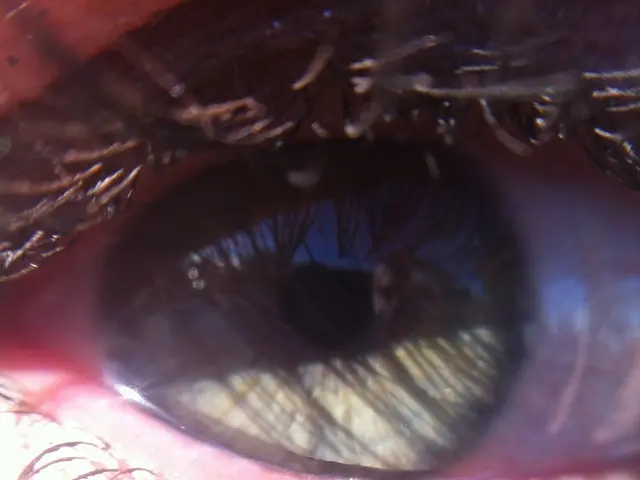Canine Dry Skin Issues: Causes and Solutions for Relief
Refresh:
A dog's coat might appear covered in white "flakes" like dandruff, signaling dry skin, but it's crucial to keep a keen eye out for less visible symptoms. Doggy dry skin can manifest in various ways, such as dull, rough coats, skin inflammation, excessive itching or licking, foul odor, and even excessive shedding or hair loss.
The causes of doggy dry skin are diverse, just like the symptoms. These may include stress, weather changes, allergies, poor diet, or underlying illnesses. If your four-legged friend has scaly patches, flakiness, or flaking on their skin, and seems itchy or uncomfortable, they might be struggling with dry skin. By understanding the cause, we can determine the best course of action to help a dog with dry skin.
Symptoms of Dry Skin in Dogs
A dog with dry skin may exhibit various symptoms, including:
- Scaly or Flaky Skin
- Dull, Brittle Fur
- Red or Inflamed Skin
- Excessive Shedding
- Hair Loss
- Excessive Licking or Scratching
- Foul Odor
"Pet parents should be vigilant for dry skin symptoms to provide quick relief for their dog from discomfort," says Gary Dattner, DVM, Tandem Vet Care's chief veterinary officer. "If you observe your dog frequently itching, having dandruff, flaking, or scabs, or a funky odor on their skin and coat, arrange a consultation with your veterinarian to identify the issue and develop a treatment plan."
What Causes Dry Skin in Dogs?
Diagnosing the root cause of dry skin in dogs may require some detective work. Your vet will scrutinize your dog's skin and coat, check for parasites, and inquire about diet, lifestyle, overall health, and any recent changes to your dog's behavior.
"Dry skin may indicate a deeper issue such as endocrine diseases, nutritional imbalances, and infection," warns Antje Joslin, DVM, consultant for Dogtopia. "Other symptoms deserve attention, including lethargy, changes in energy, behavior, appetite, weight loss or gain, or any signs of infection."
These are the most common causes of dry skin in dogs:
Allergies
Common dietary allergies or poor nutritional balance can cause dry skin on dogs. Proteins like those from dairy, beef, chicken, eggs, soy, and wheat gluten are the most common allergens for dogs.
If food allergies seem to be the culprit for dog dry skin, your veterinarian may recommend an elimination diet to observe which ingredients may be causing adverse reactions. Keep in mind that there is no single best dog food for dry itchy skin; the results of an elimination diet will guide your choice of which ingredients to avoid. Your vet may suggest feeding a prescription diet using a novel protein, such as rabbit or salmon. Your dog will only receive this special diet for a limited time before being reintroduced to their old food to see if they experience a flare-up. If they do, a food allergy is likely diagnosed.
Parasites
Demodex mites, canine scabies, and fleas are not only icky but also can cause dry skin on dogs. These parasites induce itching and biting at the skin, which can result in inflammation and dry, flaky skin.
If your vet determines that your pet has an external parasite, they will provide treatment to alleviate dry skin. It's important to keep your dog on monthly preventative medications to manage fleas and other parasites and safeguard their skin.
Improper Grooming
Regularly brushing your dog's coat is important as it distributes natural oils and removes dead hair, alleviating dry skin and reducing dandruff. However, be cautious not to overdo it: "Overbathing can strip natural oils from the skin, disrupt the pH balance, and potentially cause skin irritation and infections," warns Dr. Joslin.
Some dogs need to be washed more frequently than others. Consult your vet for a recommendation based on your dog's skin and coat, and use a shampoo designed specifically for dogs—human shampoo can remove too many natural oils, exacerbating the dryness.
Stress
Chronic stress may impact a dog's hormone levels and immune system, leading to changes in their skin that can trigger excessive licking, biting, or scratching.
Illness
Certain systemic illnesses can affect the skin, and dry skin may be a symptom. Examples include hypothyroidism, Cushing's disease, and autoimmune disorders.
Weather Changes
Just like cold temperatures and dry weather can wreak havoc on your skin, they may also make your dog's skin dry and flaky. Running a humidifier during winter is one way to add moisture to the air and counteract dryness caused by indoor heating.
Breed
Certain breeds are more prone to dry skin. Fast-growing large breeds, hairless breeds, or breeds that require regular grooming may be more susceptible to dry skin compared to others. Researchers at the Royal Veterinary College also found that flat-faced breeds, including French Bulldogs and Pugs, are at higher risk of a skin condition called skin fold dermatitis that can cause symptoms like dry skin.
Treating and Preventing Dry Skin in Dogs
Dry skin can make your dog itchy, smelly, and uncomfortable, but there is no universal cure for dry skin in dogs. Your vet can diagnose the root cause, rule out underlying illnesses that may cause dry skin, and recommend treatments to alleviate their discomfort.
"The treatment for dry skin generally includes identifying and addressing any underlying medical issues and treating them appropriately," advises Dr. Joslin.
Dogs with dry skin due to food allergies may find relief through an elimination diet and new allergen-free dog food. A dog with dry skin due to fleas needs medication to eliminate the parasites.
Your vet may recommend one or more of these treatments for dogs with dry skin:
- Parasite prevention and treatment
- Switching diets
- Omega-3 fatty acid supplements
- Medicated shampoos to alleviate dry skin and itchiness
- Prescription corticosteroid medications
- Antibiotics for bacterial infections
- Antifungal medications
- Dog skin moisturizer or mousse
Dry skin can co-occur with other conditions that may warrant separate treatments. "If your pet has dry skin accompanied by sores, scabs, open wounds, hair loss or bald patches with or without excessive licking, chewing, or scratching, consult your veterinarian," says Dr. Joslin.
Additional Tips and Advice
Taking proactive steps to prevent dry skin in dogs can shield them from itching, scratching, discomfort, and potential infections.
- Regular Grooming: Regularly brush your dog's coat to distribute natural oils and remove dead hair. Avoid overbathing with human shampoo or harsh shampoos, as they may strip natural oils and disrupt the skin's pH balance. Instead, use gentle, dog-specific shampoos recommended by your vet.
- Balanced Nutrition: Ensure your dog eats a balanced diet rich in essential fatty acids (like omega-3 and omega-6) and stays adequately hydrated to support skin and coat health.
- Parasite Control: Use monthly flea and tick preventatives, and consult your vet promptly if your dog shows signs of parasitic infection to address the root cause of their skin irritation.
- Manage Environmental Factors: Use humidifiers during dry seasons, and protect your dog from harsh weather extremes to reduce skin drying.
- Veterinary Care: Have your dog examined if dry skin persists or is accompanied by other symptoms. Underlying medical problems like hormonal imbalances or skin disorders may require specific treatments.
- Stress Reduction: Minimize chronic stress where possible, as it can impact immune and hormonal balance, negatively affecting skin health.
A combination of preventative care and attentive veterinary care can help keep your dog's skin and coat healthy.
Footnote
[1] Dan G. O'Neill, Dara Rowe, Dave C. Brodbelt, Camilla Pegram & Anke Hendricks (2022) "Ironing out the wrinkles and folds in the epidemiology of skin fold dermatitis in dog breeds in the UK", Nature Scientific Reports
A dog's health-and-wellness routine should incorporate skin-care practices to maintain its coat and skin.Regular grooming, a balanced diet, and effective parasite control can help prevent dry skin in dogs, ensuring their comfort and reducing the risk of infections.








